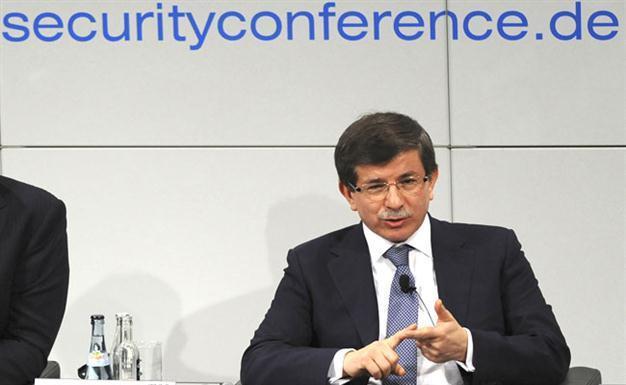Russia, China veto not based on realities, Davutoğlu says
MUNICH - The Associated Press

'Russia and China did not vote based on the existing realities,' Davutoğlu has said. REUTERS photo
The Russian and Chinese veto of a U.N. resolution aimed at ending Syria's bloodshed drew stinging criticism from Turkish foreign minister today.Turkish Foreign Minister Ahmet Davutoğlu, an increasingly influential player in the Middle East, said that "Russia and China did not vote based on the existing realities, but more reflexive attitude against [the] West."
"The veto power should not be used from this perspective," Davutoğlu said. In vetoing a "very soft resolution - which type of message are we giving to the Syrian people or in the region?," he asked.
Tunisia's prime minister meanwhile said that cutting ties with the Syrian regime is the "least that we can do."
Moscow and Beijing used their veto in the U.N. Security Council on Saturday, amid international outrage over a devastating bombardment of the city of Homs by President Bashar Assad's forces.
Their vote came shortly after Tunisia, the country whose uprising launched the past year's upheaval in the Arab world, decided to expel Syria's ambassador.
At a gathering of security officials in Germany, Qatar's minister for international cooperation said Arab nations had addressed Russia's fears.
"We say there will not be a military intervention, there will not be removal of the regime, and the economic embargo [is] optional to the Arab states," Khaled al-Attiyah said at the Munich Security Conference.
"We thought at this stage that we have satisfied their ego on this resolution," he added.
"Those two countries bear the moral and human responsibility for these massacres."
He criticized the "excessive use of the veto" in the U.N. Security Council. "This is a right that was misused, and undoubtedly the international community has to reconsider this mechanism of decision taking." Ahead of the vote on Saturday, Russian Foreign Minister Sergey Lavrov told the conference that Russia thought the resolution made too few demands of the groups opposing the Syrian regime.

Hamadi Jebali. AFP photo
"We will evaluate the situation after what happened in the Security Council and hopefully ... we will be successful to achieve a peaceful solution," Amr said.
Yemeni activist Tawakkul Karman, one of the winners of last year's Nobel Peace Prize, said of Russia and China that "those two countries bear the moral and human responsibility for these massacres." "I urge you in the name of the peaceful rebels to expel Syrian ambassadors from your countries and I urge you to call back your ambassadors in Damascus," Karman said to conference delegates.
"That is the minimum you can do to punish this regime, and I also urge you to take the necessary measures to protect the Syrian people."
















